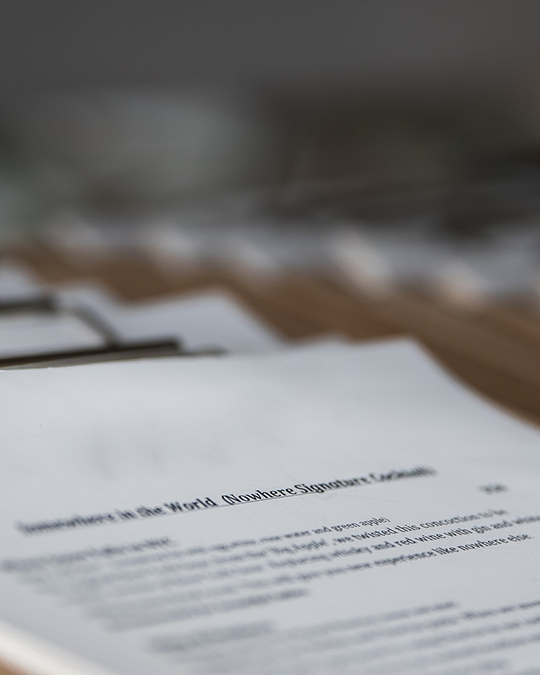Interview Transcription Services
How to Record Clear Audio on Your PhoneHow to Record Clear Audio on Your PhoneHow to Record Clear Audio on Your Phone
Transcripts makes it easy to search Interviews for important data
While recordings need to be played and replayed, back and forth, to get the exact information you are looking for, transcripts make it easy to find the desired information.
A transcript is also important for the purposes of identifying and highlighting key topics discussed in an interview.
Accurate interview transcripts for research are critical for obtaining meaningful intelligence from data.
In order to turn your recording into a suitable transcript, you have two options to consider:
Transcribe It Yourself
The first option is to transcribe the recordings yourself. While this seems reasonable and saves money, is usually not viable if you require the information urgently, or are not very patient. Transcription requires a lot of time. It can take an entire day to transcribe interviews with 60 minutes of recording. For professional transcribers, with a typing speed of 100 words or more a minute, it still takes about 4 times more time to transcribe the actual length of the recording. For yourself, check this article on how fast transcribers need to be to complete their transcripts within certain times.
For most users, this amount of time is not doable, especially for many professionals. Time is of the essence in many cases. For example, a journalist in media needs their interviews transcribed for breaking news, a university, academic, business, researcher requires a correct analysis for a key finding, or a lawyer or medical practitioner needs the perfect transcript for a pending decision or the outcome of a case.
Outsource Transcription
The second option is to outsource recordings to a reliable transcription service. If this is your preference, then you must choose between using one of the more recent AI machine speech to text services or to a reliable human transcription service.
Both services have their benefits and disadvantages when it comes to providing interview transcription services. Alternatively, hybrid models that engage both human transcribers and software to provide the transcript, like Nibity, are an option for those with specific transcript requirements.
Interview Transcription Tips
Whichever option you select to transcribe your interview recordings, ensure your interview transcript follows these rules:

Ensure Accuracy
Your interview transcript should be a document that accurately represents each speaker’s words, conversational quality, and speech patterns. To achieve this, leave out things that slow the researcher down: filler words like “er,” “um,” “and then,” “you know,” and other redundant false starts and superfluous comments like “how interesting” or “really?” or “wow!” which the interviewer makes only to show that he is listening.

Make it Easy To Understand
The interview transcript should be easy to read and understand, with the correct spelling of words, the correct spelling of place names, people’s names, and brand names. This will provide ready-to-be-used material for a project, for a thesis, for a book, for the next day’s newspapers.

Be Thorough
Finally, an interview transcript should be complete and include all the words and transcribable sounds in their order of occurrence.
Interview Transcription Services
Interview transcription is a word-for-word written documentation of a recorded interview. All types of interviews pertaining to legal cases, businesses, research, celebrity news and many other subjects can be transcribed.
Transcription Price Calculator
Quote or Order
Your Transcription
Use our Transcription Calculator to get an instant quote or to place an order now.
How do I upload my files?
Audio and video files can be uploaded via our secure online workflow system. Once files have been processed, you will receive a notification with instructions on how to collect your transcripts. Get started here.
What are the costs?
Costs are calculated per recorded minute and dependent on turnaround time required.
For budget options, longer turnarounds are available. Time Coding, Full Verbatim and Special Formatting options incur a surcharge.
How long are quotes valid?
Quotes are valid for 30 days from date of quotation. Save your job as a draft should you wish to complete your order at a later stage.
Do you have an office in my area?
Our main operational offices are located in the United Kingdom and South Africa while we have points of presence in various territories globally. Please click here to get in touch with us.
Additional Services
Captioning Services
Perfectly synched 99%+ accurate closed captions for broadcast-quality video.
Machine Transcription Polishing
For users of machine transcription that require polished machine transcripts.
Academic Transcription
Clients include universities, teaching schools, academic institutions.
Commonly used for academic research, field studies, postgraduate research collections, focus group recordings and analysis, institutional lectures and speeches, as well as academic presentations.
Business Transcription
Clients include companies and businesses of all sizes and across all industries.
Commonly used for conference calls, earnings calls, management proceedings, market research strategies, stakeholder presentations, boardroom and corporate meetings, entrance or exit job interviews, AGMs as well as minute reports or memos.
Conference Transcription
Clients include event companies, businesses and government institutions that host conferences and workshops.
Commonly used for conferences, seminars, and workshops that cover topics such as research methodology seminars, business development, entrepreneurship, technology, education, culture and community, finance, business models, corporate strategy, tourism, leadership, energy, environment, as well as medical research.
Disciplinary Transcription
Clients include human resource departments, managers, labour lawyers, unions, business and government.
Commonly used for issues related to disabilities, discrimination, employee development, employee discipline, employee leave management, equal employment opportunity, harassment and special work arrangements.
Financial Transcription
Clients include corporations, merchant banks, regulatory bodies, building societies, accountants, compliance companies, business schools, finance advisers, webcast providers, management consultants and finance portals.
Commonly used for forex consulting, wealth management advice, insurance agreements, finance brokering, banking, investor relations, earnings calls, annual financial and budget meetings, business surveys, interim company results, financial seminars and training sessions, analyst interviews, financial reports and company reports.
Focus Group Transcription
Clients include business services, marketing groups, PR companies, brand houses, research groups, academic institutions and government departments.
Commonly used for roundtable discussions, surveys, market research, business discussions, brainstorming workshops, strategic planning sessions, academic research, meetings and group discussions.
Government Transcription
Clients include local, regional, federal, provincial, state and national governments.
Commonly used for meetings, parliamentary discussions, public policy debates, public reports, cabinet or other government minutes and government research into its many programmes.
Insurance Transcription
Clients include insurance, medical and legal professionals and any other relevant or related claims experts.
Commonly used for insurance recorded statements, insurance testimonials, insurance and damage reports, agent summaries, file interviews, notes on investigations and probes, summary reports, theft/property damage reports and insurance reports for property, casualty, holdings and assets.
Interview Transcription
Clients include professionals from various disciplines, including business people, lawyers, authors, journalists, students, researchers, recruiters, multimedia professionals, and police.
Commonly used for research interviews, one-on-one interviews, job interviews, news/journalist interviews, radio interviews, focus group interviews, group discussions, legal interviews, market research, police interviews, teleconferences and telephone interviews.
Investigation Transcription
Clients include attorneys, police departments, detectives, private investigators, law firms and private individuals.
Commonly used for police investigations, property investigations, insurance investigations, disciplinary hearings, crime scene investigation, forensic reports, taped confessions, surveillance recordings, wiretaps, fire and motor accidents, legal proceedings, hearings and private meetings, medical investigation and even scientific investigations.
Legal Transcription
Clients include law firms, law enforcement organisations, attorneys, police departments, detectives, private investigators and private individuals.
Commonly used for general correspondence and memos, attorney dictation, deposition transcripts and recorded witness statements, medical-legal reports, debt collection, legal agreements, contracts, wills and trust documents, commercial and domestic conveyancing, medical negligence and personal injury, immigration, videotaped depositions or interviews, surveillance and investigative reports and telephone hearings.
Market Research Transcription
Clients include market researchers, marketing specialists, brand houses, businesses and government.
Commonly used for collecting data from potential customers, focus groups, producers and service or product providers for evaluation or to capture insights from a wide variety of sources: focus groups, consumer forums, interviews, opinion polls on possible outcomes for a market strategy.
Media Transcription
Clients include broadcast companies, television studios, production houses, news journalists, newspapers, social media distribution agents, video creatives and podcasters.
Commonly used for films, television shows, documentaries, adverts, promotional videos, training materials, news pieces, podcasts, radio broadcasts and talk shows.
Medical Transcription
Clients include doctors, nurses, administrators, medical researchers, pharmaceutical companies and other healthcare providers.
Commonly used for keeping patient records, doctor dictated reports, procedures and notes, treatment history of patients, medical research interviews, healthcare research and medical findings.
Podcast Transcription
Clients include podcasters, media houses, radio stations, social media thought leaders and participants.
Commonly used for webcast lectures, interviews, legal proceedings, sports events, audio library hosting, webcasts and television studio conferences.
Police Transcription
Clients include police departments, government security agencies, private security firms and other law enforcement agencies.
Commonly used for suspect interviews, patrol reports, disciplinary hearings, tribunal hearings, victim interviews, witness statements, fire reports, emergency service phone calls, 911 or other emergency dispatch calls, memorandums and internal communications, surveillance footage and wiretaps, inmate or prisoner phone calls, and staff and departmental meetings.
Sermon Transcription
Clients include churches, prayer groups, bible study groups and other religious bodies.
Commonly used for church lectures, religious coaching, church notes, church correspondence, prayer/study groups, ministry, gospel seminars and bible reading.
Telecommunications Transcription
Clients include individuals, business, and government.
Commonly used for teleconferences, videoconferences, Skype, VOIP, WhatsApp or other software chat services.
